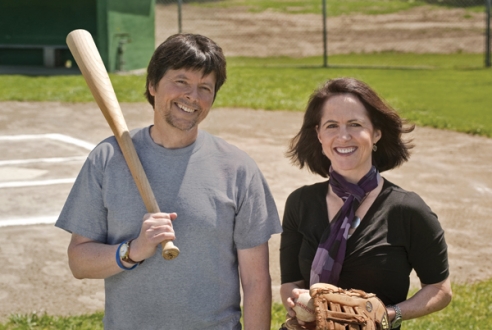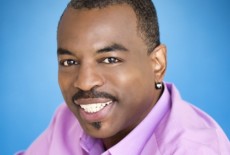(Re)play Ball!
(Appeared in the October 6, 2010 issue of Time Out Chicago)
The most-watched PBS series ever goes into extra innings.
By Christina Couch
Ken Burns and Lynn Novick aren’t the first to compare America’s favorite pastime to America itself. They are the first to devote 22 hours of footage to it. Sixteen years after its release, Baseball, the pair’s nine-part Emmy Award–winning PBS documentary, is still the most-watched series in the history of public television. This week its sequel, Baseball: The Tenth Inning, comes to DVD, Blu-ray and on demand. We caught up with Novick—who produced both films and codirected this one—to find out exactly what’s left to say after 18 and a half hours of b-ball history.
Seriously—a sequel?
I know. You’d think we’d be done after 18 and a half hours, but baseball didn’t end because our film did. Some of the most amazing things transpired from 1994 to now. We made the original Baseball because we thought that the sport was a really compelling way to look at American society, so making the sequel offered an amazing opportunity to see where we’ve been in the last century in terms of deregulation and globalization and steroids. We wanted to look at what issues like that in the sport say about our society.
And what do they say?
They really show us what we value. For example, when we look at performance-enhancing drugs, it shouldn’t surprise us that this happened in sports because our regular lives are pharmacologically enhanced. Our kids take pills to do better in school. We take pills to perform better in the bedroom, and sports are no different. We’ve also seen what happens when you have no rules and you have no cops. That’s the situation that we’ve had in our financial industry, and people cheat when that happens. That’s what happened in baseball. There was no enforcement and no [drug] testing. The players are the most public face of the game, but we feel that blame has to be more spread around. There are the Major League Baseball owners who didn’t push for testing. There were sportswriters who suspected things were going on but couldn’t write about it, and then there are the fans who bought the tickets. We wanted to humanize that story, put it in context and try to get beyond the talk radio shouting, which undermines sports and what they really mean. We’re not absolving the players of responsibility or saying that they didn’t do anything wrong. They did, but it’s important to look at it in context.
There’s a part in The Tenth Inning when Chris Rock says if anyone could take a pill to do their job better, they would. After really documenting this issue, would you?
Honestly, I don’t know. It’s easy to say absolutely I wouldn’t, but in reality, if I knew that I wouldn’t get caught and I knew that it would help me do my job better and get paid ten times more, I don’t know. I just—I don’t know.
You guys made the first film as a retrospective. How was making the sequel with all of these major stories happening around you during filming?
When we did the original Baseball, we knew how many home runs were hit, we knew Jackie Robinson’s story. With this, we had new things coming up every day. That was a very new experience for us. It was fun and it was a little terrifying because new revelations could come out that would show information in the film to be incomplete. That kept us awake at night.
Did you change anything in terms of how you filmed it?
Each time we go out, we try to push ourselves creatively and not to fall back on what we’ve done. In The Tenth Inning, you’re seeing an edgier presentation. You’re seeing faster music and faster cuts, and I think that’s totally appropriate to the material. It’s of a piece with the original series, but it will also feel very different. We don’t want to be predictable.
Between Baseball [18.5 hours], Baseball: The Tenth Inning [4 hours], The War [14 hours] and The Civil War [10 hours], you spend some serious time with your subjects. How do you choose one thing to be obsessed with for five or so years at a time?
It’s a little bit organic. Each subject comes about for different reasons. The Civil War was so heavy and tragic. When it was over, we both didn’t want to do something so epic. Ken and I are both big baseball fans but I didn’t know that much about the history of it.… I like subjects that I don’t usually know much about but am interested in. Part of the fun for me is just the research process, trying to figure out—if we’re going to do the history of jazz, for example—who are the most important figures to include and how they help us understand American life.
Burns has said “the perseverance of the game is the real star of the film,” and you’ve stated that “baseball will always reinvent itself.” Where do you see the sport heading in the next ten years?
If you had asked me that back in 1992, I wouldn’t say that a strike and steroids were going to be the thrust of the game. I think now what you will see is increasing spending, and it will grow tremendously with the globalization of the game. [Professional baseball is] going to expand into other countries and be able to profit from that economically and in terms of talent. It’s going to be good for the game.
And good for you too? Could there be another sequel in the works?
Ha, ha, ha, probably not, but who knows?
Baseball: The Tenth Inning is out now.






